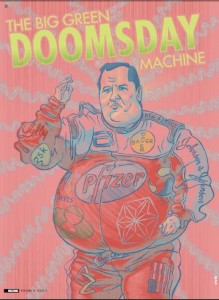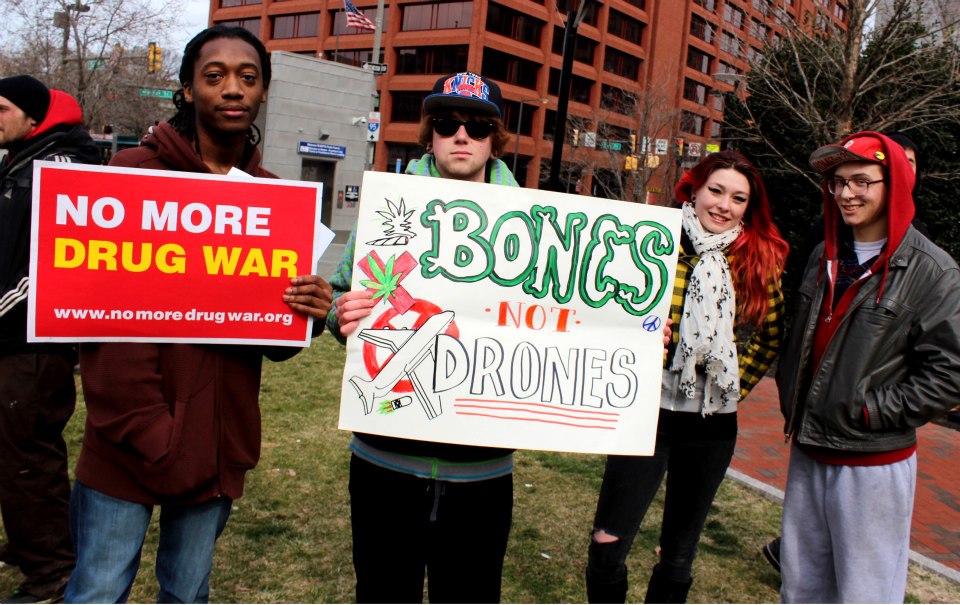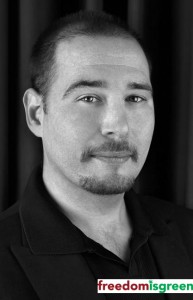
illustration from Skunk Magazine
Printed in the current issue of Skunk Magazine; by Chris Goldstein and Beth Mann from freedomisgreen.com – It is 2012 and a team of political super-villains is plotting to keep marijuana illegal in the USA forever. The steady march to make holistic marijuana therapy available in the US is on the brink of being taken over and exploited indefinitely.
This subversive and nefarious attack is most apparent in states like California. The federal storm troopers smashing up dispensaries and beady-eyed IRS guys seizing property are simply the henchmen.
The new strategists include corporate interests and Big Pharma. These sharks smelled the cash in the water and have quickly allied themselves with old school prohibitionists for a full scale market takeover.
This evil scheme isn’t just happening in the West where legal, upstanding dispensaries are closed by the dozens; it’s a national coup with a powerful command post on the East Coast.
The State of Christie
New Jersey is a celebrity state for which most have a certain familiarity. Watching a Kevin Smith flick, singing along with The Boss and following Snooki on Twitter makes anyone feel like they have an intimate knowledge of the Garden State.
Sandwiched between New York City, Philadelphia and Washington, DC, there is a kind of unique, center-of-the-storm mentality to true New Jerseans. Citizens are diverse and generally wear their residency with a certain weary pride.
Yet New Jersey is the septic tank of American politics – housing some of the most off-balance, drama-filled, high-dollar and just plain sleazy elected officials in the country. Leading the pack is our Tony Soprano-like governor: Chris Christie.
Large, loud and generally angry, Christie’s most distinguishable feature is his comic-book proportions. He isn’t slightly rotund–he’s extremely obese. Yet he is light on his feet and quick with a smile. Christie possesses that superpower charm that politicians must hone in order to succeed. In fact, his girth is disarming; it distracts you from the real monster underneath.
Chris Christie has always been a political animal. A stint as a county freeholder paved his way to the State Assembly but local Republicans smacked him down at the polls. Without an elected seat, Christie haunted Trenton as a professional lobbyist. In 2000 he found his niche raising campaign cash for George W. Bush and getting chummy with Karl Rove. In 2001, Christie was tapped by President GW Bush to be the US Attorney for New Jersey.
Each state has federal prosecutors assigned and appointed by the President. The job of the US Attorneys is to fight the most serious crimes on behalf of Uncle Sam: mobsters, gangsters and Ponzi scheme operators.
This job also taught Christie all the inside baseball he would need to leverage federal prosecutors over medical marijuana later in his career.
The Gray Area Grows
US Attorney General Eric Holder, the boss of all the US Attorneys,issued a cryptic communique in 2009 concerning medical marijuana. Drafted by Deputy Attorney General David Odgen, it is now commonly referred to as the “Ogden memo.”
Forced to define a position on medical cannabis for the Obama administration, Ogden created an important outline: federal resources were not be used to prosecute individual American citizens using marijuana for a serious illness.
But Ogden had to admit, in the same memo (and in formal legalese), that US Attorneys should uphold federal law and shutdown cannabis facilities even if they were fully regulated by state law. The contradiction has created a complete circus ever since.
These wide-open loopholes left the US Attorneys, US states, and even the cannabis industry to their own interpretations. Dispensary owners viewed this protection to the individual patients as applying to their businesses. They were in for a rude awakening.
The Golden State of CA is currently experiencing its most serious sweep of dispensary shutdowns under the direction of US Attorney Melinda Haag. Like Christie, Haag’s appearance speaks volumes, and exudes a certain “cackling evil witch” quality. She aligned all of her federal resources – The Drug Enforcement Administration (DEA), The Internal Revenue Service (IRS) and even The Department of Homeland Security (DHS) – to rabidly go after individual dispensary businesses.
While other US Attorneys in Michigan, Oregon and Colorado have taken some similar action, Haag has stood alone in her dogged and maniacal pursuit of federal marijuana prohibition. That gray area of conflict between state and federal law gives Haag full discretion to act how she pleases.
The No Garden State
On January 18, 2010, one day before he left office after one term,former New Jersey governor Jon Corzine signed the Compassionate Use Medical Marijuana Act (CUMA) of New Jersey into law. Patients were promised full implementation within six months. Sponsoring legislators heralded it as the most “restrictive” law of its type in the nation, much to the chagrin of local activists.
New Jersey’s law was the first to eliminate home cultivation by registered patients. Instead, all qualifying residents would be forced into an approved Alternative Treatment Center (ATC) for their legal pot.
And while strict in measure, the law still lacked needed regulations and a formal structure. That was left to the incoming administration and has proven to be an unfortunate opportunity for conservative prohibition enthusiasts. On January 19, 2010, Chris Christie was sworn in as Governor,on the heels of serving as US Attorney.
Pill Pushers See Green
The old saying that politics makes strange bedfellows was probably invented outside of a cheap motel on the NJ Turnpike.
Bristol-Myers Squibb, Pfizer, Johnson & Johnson and Merck all have major research laboratories in New Jersey. Some of their major corporate offices are based here –and not because they like Bon Jovi.
These pharmaceutical mega-giants have spent decades and billions of dollars lobbying in Trenton. This has paid off in the form of tax-breaks, favorable zoning and contracts with state academic institutions, like universities. And they aren’t the only ones: insurance companies and major hospital groups have also worked hard to make the Garden State a very comfy base for their global businesses of chemical-based healthcare.
While these mainstream medical groups have kept marijuana at arm’s length elsewhere, they have a different angle in New Jersey. The component cannabinoids within the natural cannabis plant have long been the Fort Knox of the pharma industry. This potential money-making drug is kept under lock and key by the Feds. But in New Jersey, they are drilling into the vast and wealthy vault of pharmaceutical derivatives.
Governor Chris Christie’s first move on medical marijuana showed why he is so dangerous. In 2010 he bought time for his corporate plan to solidify and then corralled the support of the NJ Legislature. The same politicians who had fought for years to get the compassionate law passed instantly acquiesced to Christie.
They smelled the cash too.
Christie and his administration have been able to create the cannabis program at their own pace and to their own design. What has emerged, almost three years late, is a Soviet-style system that is the biggest threat to the small business, holistic medical marijuana industry in America today.
Welcome to the ominous beginnings of Corporate Cannabis controlled by Big Business.
The super villain master plan is about to bring this show on the road, coming to a town near you.
Hammer and Sickle Time
Chris Christie’s designs for medical marijuana seem like they were crafted over a dinner with Josef Stalin. A set of 128-page regulations was dropped like a ton of bricks in 2010. The Department of Health, the Department of Consumer Affairs, The Office of the State Attorney General and even the Governor’s Counsel [even the State Police] would have their hands on every step of the process.
This is government at its biggest and most intrusive; the polar opposite of the conservative “hands off” Republican ideals that Christie claims to harbor.
To advocates and patients, the rules for the ATCs were nothing short of draconian. They limit growing to only three strains of cannabis per ATC and none can exceed 10% THC potency.
Patients are also limited to just 2 ounces of this mid grade pot per month. It cannot be delivered to a patient’s home; the seriously ill resident or a single designated caregiver must visit the ATC to purchase their medicine. The only three forms of cannabis allowed to be sold by a New Jersey ATC are raw plant material, lozenges and a topical cream.
No hash, no edibles, no tinctures, no genetic variety. Sterile and homogenized; NJ’s castrated cannabis has become barely medicine and barely accessible.
But it didn’t stop there. The politicians who sponsored the law said that they didn’t want a “California or Colorado” type of program, implying that anyone with a common cold could have easy access. So NJ physicians are now forced to join a special registry in order to recommend medical marijuana. Seriously ill residents cannot even apply for their ID card unless they go through one of the handful of approved doctors.
The Garden State Pot Doctor List opened in late 2011 and only about 150 of the 30,000 physicians in New Jersey signed up. When the patient registry was opened in August 2012, this concept proved itself a dismal failure. Only 18 qualifying patients registered after a week, proving if you close enough doors, few will enter.
The Soprano System
While NJ regulators starved the patients in need, they happily tossed juicy bones to corporate interests involved with mainstream medicine. Only six Alternative Treatment Centers will be providing all of the legal cannabis for a state of nine million people. This was the birth of an exclusive, state-run cartel.
Making sure to keep it in the family, Christie’s DOH awarded the NJ Alternative Treatment Center’s contracts to business groups with deep connections to Big Pharma and machine politics.
Freedomisgreen.com filed an Open Public Records Act request to obtain the ATC applications. Analysis revealed that the winners plan to invest as much as $70 million to start up each site. Much of the capital will be spent on laboratory equipment and scientists’salaries to conduct private research on cannabinoids.
The brother of former Republican NJ Governor Christine Todd Whitman, Mr. Webster Todd Jr., is the CEO of Compassionate Sciences Inc. Todd used to be the Chairman of the National Transportation Safety Board, a far cry from being an experienced cannabis provider.
But the buddy system doesn’t stop there. As of this writing,only one out of the six NJ ATC facilities has a full permit to grow marijuana: Greenleaf Compassion Center. NJ Assemblyman Thomas Giblin, a Democrat, is on their Medical Advisory Board. Giblin is the only sitting state elected official in the nation to be involved in this capacity at a medical marijuana facility.
*Note – As of 11/16/2012 Greenelaf has still refused to begin selling cannabis to patients citing tax concerns – even though they are the only facility fully permitted to do so.
Playing Chicken with the Fed
Chris Christie figured out how to concentrate the cash but the Stalin-style regulations weren’t enough; he had another card to play.
With his knowledge as a US Attorney, he manufactured a new conflict between New Jersey’s CUMA and federal law.
Christie claimed that he feared that NJ state employees could be at risk of federal prosecution. Using all of his expertise and power, Christie was making the ultimate move into the gray area of medical cannabis laws.
The Governor directed NJ Attorney General Paula Dow to send a letter to US Department of Justice. Christie was making President Obama and the US DOJ clarify their position on state authorized medical marijuana facilities so he could capitalize on the response.
This was all pure politics. Republican conservatives cheered. The Obama administration squirmed. The medical marijuana industry in America, rightfully, held its breath.
Deputy US Attorney General James Cole issued a new memo on June 2011 in response to New Jersey but directed to all US Attorneys. Freedomisgreen.com was the first to obtain the document and distributed its full text to the public.
Here’s the critical section:
The Odgen Memorandum was never intended to shield such activities from federal enforcement action and prosecution, even where those activities purport to comply with state law. Persons who are in the business of cultivating, selling, or distributing marijuana, and those who knowingly facilitate such activities, are in violation of the Controlled Substances Act, regardless of state law. Consistent with the resource constraints and the discretion you may exercise in your district,such persons are subject to federal enforcement action, including potential prosecution.
State employees ran no risk of federal arrest. Still the USDOJ was obviously speaking directly the medical marijuana community. In layman’s terms: Ogden said that spending tax dollars to have federal prosecutors and DEA soldiers attack an American in a wheelchair smoking a joint (or growing in a closet) was a waste. But the DOJ firmly upheld the shutting down of any shop that provided that cannabis.
The Cole memo provided steel-enforcement for zealots like Melinda Haag. That was Chris Christie’s plan: provide anti marijuana US Attorneys extra ammo to go after legitimate, small-business dispensaries and make room to install their own corporatized cartel scheme.
The End Game
We used to worry that Reefer Madness-style opposition would roll back state medical marijuana laws. But the new take-over strategy relies on them being in place. Replicating the New Jersey law and the subsequent regulations is the new opposition key. Delaware and Connecticut are the most recent states to pass compassionate use: nearly exact copies of NJ. With all the built-in giveaways to corporate medical interests, this blueprint is an easy sell [to slick politicians].
Political pressure is also being put on state legislatures and even down to the county level to amend or re-regulate existing medical cannabis laws. (Guess which model they’re pushing?)
The current medical marijuana industry in America could be on the edge of a real doomsday. The next move from the likes of Haag and Christie is to shut down every single small-business cannabis garden or dispensary operation and replace them with corporate cartels. Imagine just six medical cannabis facilities for all of California.
To maximize the long-term profits, the big corporations will likely use their significant lobbying clout to fight national marijuana legalization. Given enough time to conduct secret research under exclusive state contracts, they will likely develop synthetic copies of natural cannabinoids in pill form. Those drugs would be perfectly legal and patent-able, just like Marinol (the 100% synthetic THC).
Hope still lingers. State-level pro-marijuana politicians like Assemblyman Tom Ammiano in CA and Diane Russell in Maine are pushing hard for freedom from these constraints. Longtime supporters in Washington DC like Reps. Barney Frank (D-MA) and Ron Paul (R-TX) are retiring but a savvier generation is getting elected. Congressman Jared Polis (D) of Colorado is a good example.
Awareness of the opposition plan gives us tools to fight it.
The immediate pressure coming down on California from US federal agencies can be alleviated immediately by Congress or the President.
But now, only a President and/or federal legalization of cannabis will stop the corporate medical marijuana cartels run by the states.
Their next move is to go international with this wretched scheme.
Unless we focus our efforts like a laser-beam on President Obama’s stance, the prohibitionist villains will prevail.
Chris Goldstein is a respected marijuana reform advocate. As a writer and radio broadcaster he has been covering cannabis news for over a decade. Questions? [email protected] Note – This article was originally published on October 1, 2012 in Skunk Magazine, in print only.
 4/7/2011 – Riding a green wave of unprecedented public support, medical marijuana legislation is gaining significant progress in several East Coast states. Connecticut, Delaware, Maryland and North Carolina all reached important milestones in the last two weeks towards legal access to therapeutic cannabis.
4/7/2011 – Riding a green wave of unprecedented public support, medical marijuana legislation is gaining significant progress in several East Coast states. Connecticut, Delaware, Maryland and North Carolina all reached important milestones in the last two weeks towards legal access to therapeutic cannabis.







